Pepperdine Libraries Cultivates a Community of Belonging Through Cultural Exhibitions and Programming
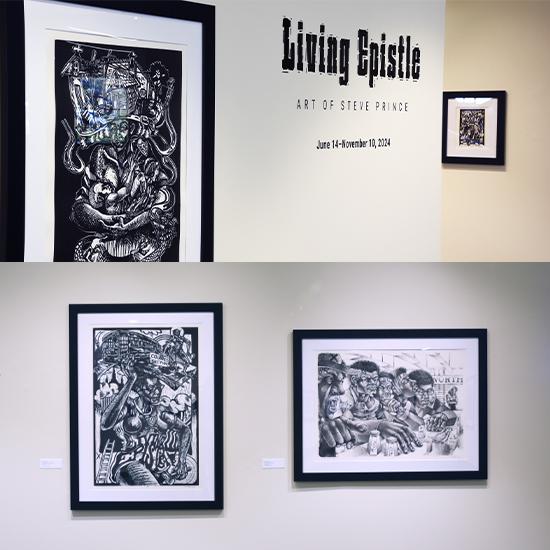
For more than 50 years, Payson Library has been a prominent feature on Pepperdine University’s Malibu campus. As one of the campus's oldest buildings, Payson Library has prioritized not only the preservation of historically and educationally significant texts but also adapting to changing technologies and the evolving needs of students. Following a comprehensive renovation in 2017, Payson Library reopened with a fresh, contemporary design and technological enhancements tailored to meet the study needs of modern students. While the initial intent for the renovation was to modernize and improve features of the existing building, the University took the opportunity to reposition Payson Library as a destination for students, faculty, and staff to interact socially and academically in meaningful ways.
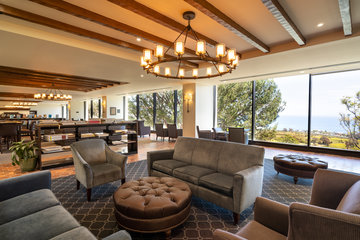 Interior of the Payson Library
Interior of the Payson Library
One of the newest features of Payson Library is the exhibit gallery, a rotating exhibition space that displays pieces from collections and works on loan from artists, collectors, and organizations. Located in the Boone Special Collections and Archives center, Mark Roosa, dean of Pepperdine University Libraries, explains that the gallery, along with the other redesigned areas of the library, were developed to create a more visionary learning atmosphere.
“We explored how to make the library a more impactful place and discovered opportunities that could support emerging academic trends while also assisting with social formation on campus,” says Roosa. “To help cultivate a community of belonging, we organize exhibitions and programs featuring individuals from a wide range of backgrounds and expertise.”
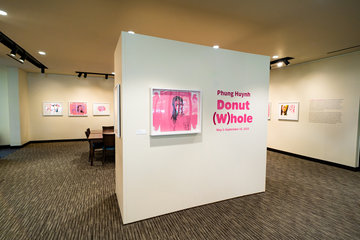 Phung Huynh: Donut (W)hole Exhibit
Phung Huynh: Donut (W)hole Exhibit
Roosa highlights several recent exhibitions that align with the library's mission to inspire culturally diverse and thought-provoking discussions. These have included Johnny Quintanilla: Life Comes in Different Waves (January 8–May 5, 2024), Phung Huynh: Donut (W)hole (May 2–September 10, 2023), and Rikkí Wright: SIS (August 23–November 7, 2021). Quintanilla, a Salvadoran American artist, created dreamlike scenes by combining organic forms from everyday objects and uses vibrant watercolors and drawings filled with symbolism to explore themes such as solitude and connection, change and acceptance, neglect and conservation, and cultural pride and assimilation. Huynh's artwork, reflecting her experiences as a refugee of Cambodian and Chinese descent from Vietnam, examined the doughnut shop as a cultural space where refugees and immigrants reshape their lives through assimilation, identity negotiation, and becoming American. Wright, in her Black sisterhood series, SIS, delved into the complexities of sibling relationships, investigating experiences of compassion and competition, love and jealousy, and indescribable joy within sisterhood through her photography.
Open now until November 10, 2024, Payson Library has on display the work of artist Steve Prince, who spreads messages of faith and hope that are philosophically rooted in the cathartic nature of the jazz funerary tradition of his native city, New Orleans. The showcase of prints, titled Living Epistle: Art of Steve Prince, celebrates the Black experience with depictions of everyday life alongside significant historical moments of fighting against injustice. Of note, on view in their original format is a series of Prince’s linocut illustrations featured in Flannery O’Connor’s Why Do the Heathen Rage?, the new book by Jessica Hooten Wilson ('04), Fletcher Jones Endowed Chair of Great Books at Pepperdine’s Seaver College.
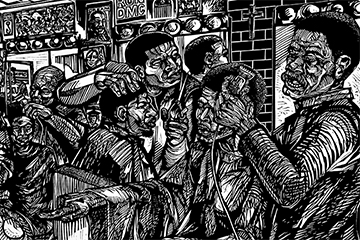 Living Epistle: Art of Steve Prince Exhibit
Living Epistle: Art of Steve Prince Exhibit
“Prince’s chosen medium for most of the works in the exhibition—linocuts—lends itself well to bold, high-contrast designs,” explains Roosa. “The striking contrast of the thick black ink against a neutral background in the compositions reflects the boldness of the subjects depicted. The work featured in this exhibit helps to demonstrate his distinct style and use of complex layered structures that underscore the Black narrative and spiritual undertones in his art.”
In addition to the exhibitions, Pepperdine Libraries hosts public programming—from book talks by local authors to guitar recitals and private dinners with members of Pepperdine’s Board of Regents—in Payson Library’s Surfboard Room. Home to a collection of historic surfboards, the unique venue provides a space for individuals to exchange ideas and frequently features dynamic and intellectual discussions led by professors, historians, and field experts.
Recent presentations have included “Cultural Engagement with Indigenous Artifacts” with Santa Ynez Chumash community member Carmen Sandoval and “27 Summers: From Incarceration 2 Restoration” with Mississippi Department of Corrections chaplain Ronald Olivier—presented during the library-hosted symposium “Faith, Reconciliation, and Flourishing: A Symposium on Prison Reform” in conjunction with the Payson Library exhibition Johnny Cash at Folsom and San Quentin. Payson Library also hosted “The Making of a Sporting Mexican Diaspora” with California State Channel Islands Chicana/o studies professor José M. Alamillo.
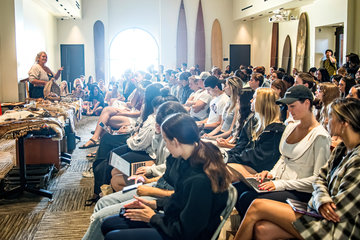 Indigenous Artifacts” with Carmen Sandoval
Indigenous Artifacts” with Carmen Sandoval
In collaboration with the Office of Community Belonging, Pepperdine Libraries also hosts the annual Larry Donnell Kimmons Memorial Lecture Series, which features speakers who discuss varied, faith-based perspectives on social justice. Furthermore, Pepperdine Libraries recently debuted the Preserving the History of South Los Angeles project aimed at collecting, preserving, and sharing oral histories from the South Los Angeles community.
“Our goal is to create opportunities for Pepperdine community members to engage in civil discourse through events and exhibits that capture a variety of topics from a posture of humility,” shares Roosa. “We want to encourage students, as well as faculty and staff, to open their minds to various learning and social possibilities and connect them directly with original materials and thought leaders.”